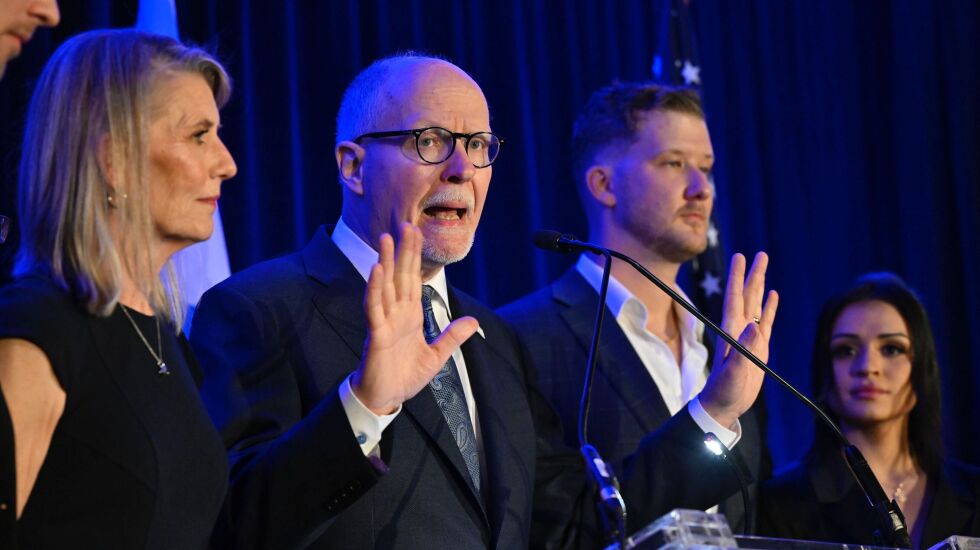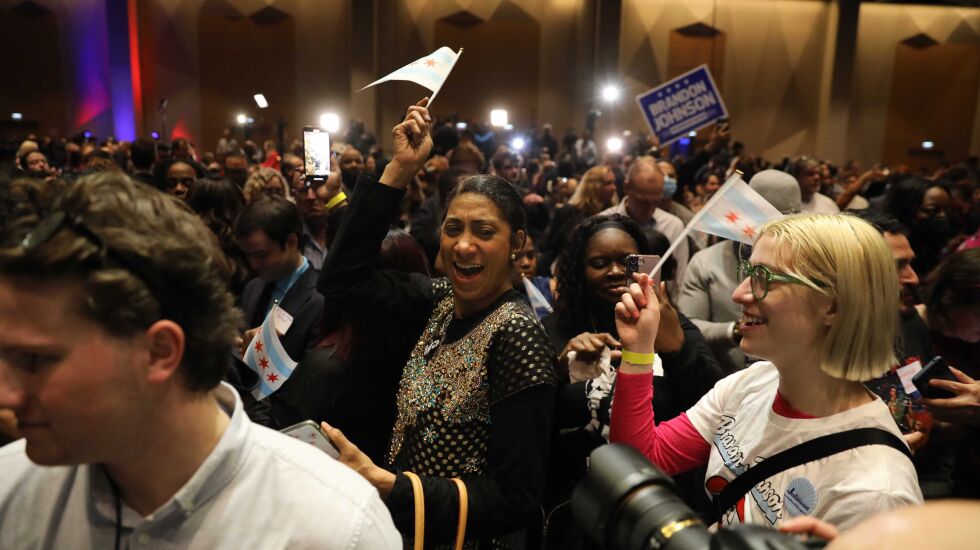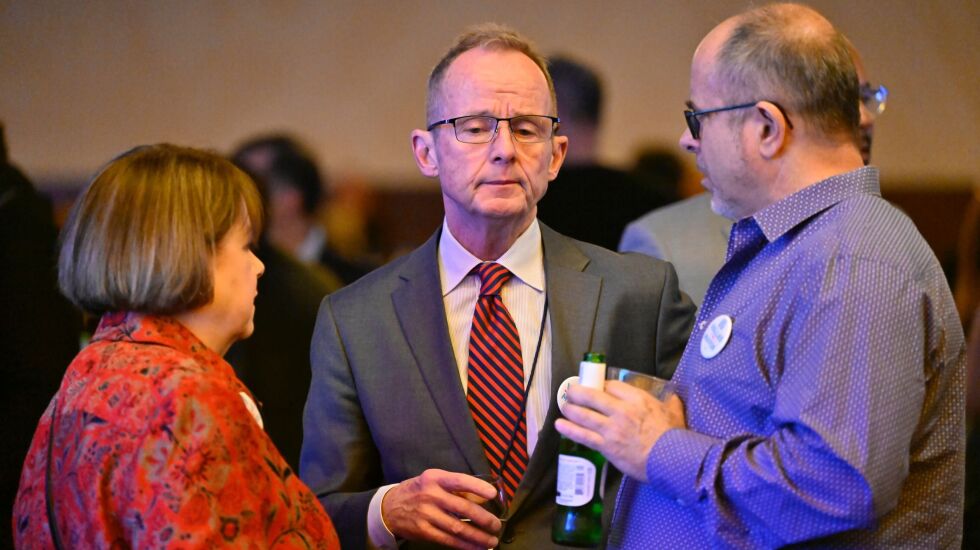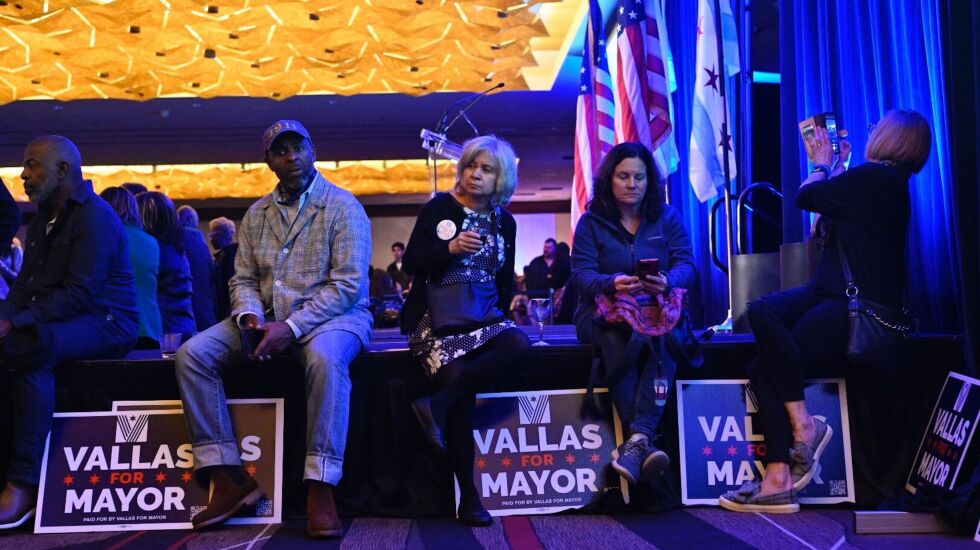Cook County Commissioner Brandon Johnson, a paid organizer for the Chicago Teachers Union, will become Chicago’s 57th mayor.
“My name is Brandon Johnson and I can’t wait to be sworn in as the next mayor of the greatest city in the world,” a euphoric Johnson, 47, told his cheering supporters at the Marriott Marquis Chicago, 2121 S. Prairie Ave.
“To the Chicagoans who did not vote for me, here’s what I want you to know: That I care about you. I value you and I want to hear from you. I want to work with you. And I’ll be the mayor for you, too. Because this campaign has always been about building a better, stronger, safer Chicago for all the people of Chicago.
After an exhausting, five-week battle for the heart and soul of Chicago, Johnson narrowly defeated former Chicago Public Schools CEO Paul Vallas, who led early, only to have Johnson overtake him and stay there.
With 99.6% of precincts reporting, Johnson had 51.42% of the vote to 48.58% for Vallas — a margin of 15,872 votes out of 557,422 cast.
Although 90,000 mail-in ballots remain uncounted, Vallas did not hold out for a full count that would have dragged Election Day into Easter weekend.
He took the podium at the Hyatt Regency Chicago at 9:45 to tell his cheering supporters that he had called Johnson to offer his support to the mayor-elect.
“I ran for mayor to bring this city together and it’s clear, based on the results tonight, that this city is deeply divided. So tonight — even though we believe every vote should be counted — I called Brandon Johnson and told him that I absolutely expect him to be the next mayor of Chicago,” Vallas said.
When some of his supporters shouted, “No,” Vallas admonished them.
“Please, please, please. It’s critically important. This campaign that I ran to bring this city together would not be a campaign that fulfilled my ambitions if this campaign is gonna divide us more. So it’s critically important that we use this opportunity to come together,” Vallas said.

Jason Lee, a senior adviser to the Johnson campaign, was ecstatic about his candidate’s performance.
“We outperformed on the lakefront. The turnout was good. We outperformed on the South Side in terms of the margin. It could be the case that some of the voters on the South Side who felt like they couldn’t vote for us didn’t vote at all,” Lee told the Sun-Times.
With 90,000 absentee ballots uncounted and a 52% return rate, Johnson likely will pad his margin of victory as late-returning mail-in ballots are counted later this week. Several analysts predicted he could win up to 70% of the uncounted absentee votes.
“There’s a lot of votes outstanding. We want those votes to be counted,” Lee said.

Former CTU President Jesse Sharkey, who has gone back to teaching 9th grade civics at South Shore high school, said the success of a CTU-backed candidate is “profoundly gratifying” more than a decade after social justice-oriented leaders took over the union.
“Remarkable. It’s indescribable,” he said. “We put in a lot of blood, sweat and tears into organizing work. And that’s meant something. And for the young people who are coming up in this movement, I hope that they have a similar sense of possibility.”
Sharkey said the city’s progressive movement still must fight for recognition — but that’s a new, welcome fight.
“We need to figure out how to actually invest in those neighborhoods and pull people into the political process,” Sharkey said. “I don’t think we have enough power. I think the people who make corporate opinion, I think corporate money and I think the bureaucracy of the city is largely going to be against that program. And I think we’re going to have to organize people and try to build support for a program that’s going to change things.
“We have a whole city and a whole future ahead of us.”
In his victory speech, Johnson noted his election comes on the anniversary of the assassination of Dr. Martin Luther King Jr. The civil rights icon “organized for justice” in Chicago, “dreaming that one day, the civil rights movement and the labor rights movement would come together.” That’s what happened Tuesday, Johnson said.
“The civil rights movement and the labor rights movement have finally collided. We are experiencing the very dream of the greatest man who ever walked the earth,” Johnson said.
“On this very day 55 years ago, Dr. King stood on a balcony. But you all know it’s very clear that one bullet can’t kill a dream.”
He added: “Tonight is the beginning of a Chicago that truly invests in all of its people. ... We will not allow the politics of old to turn us around. ... We don’t have to choose between rich and poor, old and young. We don’t have to choose between toughness and compassion. If tonight is proof of anything, it’s that false choices don’t serve Chicago any longer.”
CTU President Stacy Davis Gates took the stage ahead of Johnson to massive cheers and chants of “Stacy! Stacy!” She has been seen as one of the key figures in the union’s social justice fight over the past decade and the city’s broader progressive movement.
“A Chicago for the people because it is the people who brought today’s victory to reality,” Davis Gates told the crowd.
“This feeling that we are celebrating, this feeling of unity and love, we deserve this. ... Tonight, Chicago chose hope over fear.”

Just a few months ago, Johnson was a relative unknown, even to some voters in the West Side district he represents on the Cook County Board.
He owes his meteoric rise to the millions in contributions and thousands of campaign foot soldiers provided by the CTU and its affiliates, SEIU Locals 1 and 73, SEIU Heathcare, AFSCME Council 31 and United Working Families.
They literally proved their worth. Ald. Brian Hopkins (2nd), a Vallas supporter, has called them the “new machine.”
That support in money and people allowed Johnson to rise above his greatest vulnerabilities: his past support for the concept of defunding the police; fears that his $800 million tax plan would be job killer that would drive businesses out of Chicago; and Vallas’ complaint that Johnson has “never run anything” bigger than a classroom.
“There’s still a value to be had by mobilizing an army of field workers. Not quite as much as back in the day when half the people working in the field could give you a garbage can the next day. But, to have that visible presence, there’s value in that,” said Ald. Brian Hopkins (2nd), who endorsed Vallas.
“That requires a level of dedication and passion that exceeds people being paid to do it. Most of the United Working Families [and CTU] field army have both. They’re being paid. But, they also believe in what they’re doing. They believe in ending capitalism and replacing it with socialism. They believe in defunding the police. They believe in closing the jails. It’s the way they want to re-shape society. They believe it’s possible. And they’re fired up.”

Mayor Lori Lightfoot spent millions on negative advertising in Round One to eliminate U.S. Rep. Jesus Chuy Garcia, D-Ill. She waited until it was too late to realize that Johnson was the real threat.
Lightfoot clearly wanted to handpick Vallas as her opponent, firmly believing that Vallas had a “ceiling” that would make it difficult for him to get over the 50% hump.
Tuesday’s results show Lightfoot was right about Vallas’ ceiling — even though it was Johnson who benefitted from it.
Despite an avalanche of business contributions that allowed him to outspend Johnson by a 2 to 1 margin, Vallas could not overcome his own statements — on talk radio, Facebook and Twitter — that left voters in this overwhelmingly Democratic city believing he is an anti-abortion, pro-voucher Republican.
Not even a slew of endorsements from high-profile Democrats featured in Vallas’ television commercials — including retired Illinois Secretary of State Jesse White, retired U.S. Rep. Bobby Rush and U.S. Sen. Dick Durbin — were enough to erase that perception.
Johnson drove home the point by portraying himself as “the real Democrat” in the race.
The contrast between the two runoff opponents could not have been more stark when it comes to the future of policing, public education and municipal finance.
It was, as political strategist David Axelrod put it, the “candidate of the Chicago Teachers Union” vs. the “Fraternal Order of Police” with Chicago’s future political direction hanging in the balance.
Decrying the “utter breakdown of law and order” in Chicago, Vallas vowed to fill 1,700 police vacancies, in part, by luring back officers who have retired or transferred to other departments and running day and night classes at the police academy.
He wanted to relax restrictions on foot chases, restore morale by ending merit promotions and switching police to a four day workweek and restore beat integrity by pushing resources to the district level.
A former revenue and budget director under former Mayor Richard M. Daley, Vallas vowed not to ask Chicago taxpayers for “one more penny” until he has scoured the $28 billion in city and local government agency spending under the mayor’s control to determine it was being spent wisely.
Johnson spent weeks pointedly refusing to commit to fully funding the Chicago Police Department’s $1.94 billion budget or filling 1,700 police vacancies. Instead, he vowed to cut the police budget by $150 million by streamlining the number of “non-sergeant” police supervisors, closing CPD’s Homan Square facility, and ending the three-year, $33 million ShotSpotter contract.
Vallas blanketed the airwaves with commercials featuring Johnson’s statements about defunding the police. Johnson, however, promised not to reduce the police budget by “one penny.” Instead, he highlighted his plans to promote 200 detectives and “fully fund” a consent decree outlining the terms of federal court oversight over CPD.
The cornerstone of Johnson’s anti-violence strategy is the $800 million in new or increased taxes he wants to impose to help bankroll $1 billion in new spending on public schools, public transportation, new housing, health care, mental health and job creation. Vallas has called Johnson’s plan a job killer that will drive businesses and residents out of Chicago.
As Election Day unfolded, early turnout indicators appeared to favor Vallas.
Of the top ten wards for turnout at mid-afternoon, six were Vallas strongholds: the 19th, 41st, 41st, 45th, 43rd, 44th and 2nd Wards. Only two of the top 10 wards — the 46th and 48th — were wards that heavily favored Johnson.
The turnout in several majority African-American wards also appeared to be disappointing at mid-day. And turnout in Hispanic majority wards was as anemic as it had been on Feb. 28.
But the age factor was a key indicator that tilted toward Johnson, with young voters rallying to his cause.







